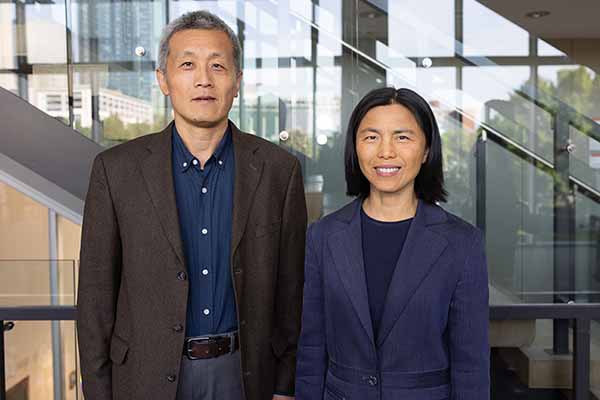Belk College researchers seek to enhance technology’s benefits, lower risks

Technology can be useful, but it can open the door to problems. UNC Charlotte researchers Dongsong Zhang and Lina Zhou are leaders in research that advances technology’s positive aspects and reduces its risks for individuals and organizations.
“The research we do is motivated by critical real-world problems with significant societal implications,” said Zhang, Belk Distinguished Professor in Business Analytics. “We hope that our research can benefit people in their daily lives and stimulate new ideas from other people.”
Zhou and Zhang are faculty in Belk College of Business’ Department of Business Information Systems and Operations Management, where their Knowledge-driven Analytics, Informatics and MobiSystems lab is housed. They have worked collaboratively for two-plus decades, conducting their research using machine learning, natural language processing, text mining, social network analysis, personalization techniques and behavioral research methods.
Zhang and Zhou draw upon their varied perspectives and expertise.
“Often I come up with a research idea through something I experience myself, or I put myself in other people’s shoes,” Zhang said. “I was getting interested in mobile human-computer interaction back in 2003, for example, when we still used the old-fashioned mobile phones. So even at that time, I started thinking about how to make user interaction with mobile phones easier.”
That interest persisted, evolving into a project to develop a virtual keyboard for mobile devices that would allow users to enter text sight-free with one hand, aiding people with disabilities. Zhou thought about that effort from a different perspective, bringing in her experiences as a research scientist at the University of Arizona.
“I have this mindset of applications to improve cybersecurity,” she said. “I saw the potential of the tool Dr. Zhang and his former Ph.D. student had developed, and I started thinking the idea could be used to improve the security and accessibility of mobile authentication. We were able to work on a grant proposal for submission to the National Science Foundation, and fortunately the project was funded.”
Their lab seeks to design and develop systems to solve problems while evaluating the broader impact of information technology on users, organizations, communities and society at large. They also want to understand and model user behaviors. Their current research is focused on three main topics:
- Online deception and misinformation detection
- Mobile device security
- Health information technology
Online deception and misinformation detection
Understanding the deceptive behavior and strategies used in online communication includes email, chats, discussion forums, social media and the like. Deception is at the heart of most attacks in online communication, including misinformation, and people are poor at detecting deception. During the past 20 years, the researchers have used text analysis and machine learning techniques to develop new and effective ways to better detect deceptive communication automatically and predictively.
Not all the behaviors that online attackers use are known, but Zhang and Zhou believe that some behaviors are more difficult for attackers to control than others. By identifying such behaviors and their relations in online communication, their project lays the groundwork for developing resilient and predictive approaches to detect the attacks, and advances what is known about online deception behavior and its identification.
Currently, they are part of an ongoing project housed at N.C. State University and funded in part by the Department of Defense to develop a gamified training system to improve employees’ ability to detect spear phishing emails, which are designed to look legitimate to entice employees to reveal personal or sensitive information.
Mobile security
Mobile devices, particularly smartphones that function as small computers, are increasingly used in work and other aspects of our daily lives, and people increasingly store personal and sensitive data on these devices. Traditional login password protection can be insufficient and vulnerable to security attacks, including surveillance video and shoulder surfing, when people spy on users over their shoulders. This makes improving the security of smartphones critical.
Zhou and Zhang’s work, funded in part by the NSF, focuses on designing and developing a one-handed, keypress-less user-authentication approach that can implicitly and continuously verify if the current user of a smartphone is indeed the owner of the device based on how the user interacts with the touchscreen of the device, such as characteristics of finger swiping and typing.
Health information technologies
Another line of their research interest is leveraging information technologies in support of public health. In one recent project, they developed a knowledge-enhanced deep learning model to automatically detect suicidal ideation or depression expressed in the content of social media posts. This model would enable the social media platforms and mental health professionals to take a proactive role by reaching out to the individuals and offering timely intervention, instead of passively waiting for those individuals to seek help. Many people may never seek help due to social bias, lack of self-awareness and cost, the researchers said.
Zhou and Zhang, in collaboration with colleagues Rajib Paul and Ahmed Arif with UNC Charlotte’s College of Health and Human Services and Atrium Health, recently started work on a new project funded by the Centers for Disease Control and Prevention and American Public Health Association. The effort is focused on classifying and nowcasting — or very short-range forecasting — of homicide incidents using natural language processing, deep learning and spatiotemporal techniques.